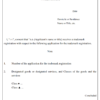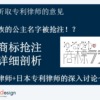2019.01.20
Vol.13 (GRANREVE)
No. 2017-600038
(Advisory opinions on the scope of trademark rights provided by the Trial Examiners of the JPO)

Class 20
Mattress
Conclusion
The used mark falls within the scope of the effects of the trademark right
Summary
The Examiners assessed that the registered mark should be pronounced as the Japanese word which was used with the registered mark. Therefore, the pronunciation of the registered mark should be similar to that of the used mark, and thus these marks would be similar to each other.
My comments
If the owner of a trademark right or the user of a trademark files a request for Advisory opinions on the scope of trademark right with the JPO, The Examiners provide their opinions based on procedures like Invalidation Trials. The opinions do not bind the parties.
Although the scope of a registered trademark has to be determined based on the trademark stated in the application (Article 27 (1) of Trademark Law), the Examiners took into account the mark which was actually used by the owner of the trademark right. According to precedent, the special or limited state of transactions of the designated goods should be taken into consideration in judging whether infringing a trademark right or not, and thus I believe the Examiner’s opinion is reasonable.
In general, when judging the similarity of marks in the examinations for the registrations, examiners should consider the states of transactions of goods which are not special or limited but general or regular. Although some judgments in courts are against this principle, this principle has been indicated in the examination guidelines since the latest revision. However, if the used mark in the present case had been filed with the JPO, the mark might have been registered based on the above-indicated principle. Even after that, the used mark would be prohibited on the basis of the special or limited states of transactions of goods. Based on this perspective, we cannot necessarily say that the above-mentioned principle is reasonable even though that principle is theoretically correct.
CATEGORY
NEW ENTRY





